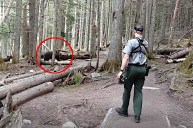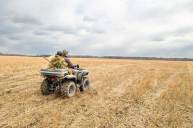Researchers say wild animals are more likely to flee from loud groups of people than any other sound. According to a new study funded by the federal government, vocal hikers or mountain bikers caused the highest probability of flight by wildlife.
For the study, researchers with the Bridger-Teton National Forest set up speakers around parts of the Wyoming forest and played a variety of sounds for approaching wildlife. The recordings consisted of people performing recreational activities, such as talking while hiking, trail running, biking, and even driving off-road vehicles. They also used trail cameras to film the animals' reactions to the sounds.
Dr. Kathy Zeller, the lead author of the study, explained that their work, published in the spring issue of the journal Current Biology, is "the first to quantify responses to human-produced recreation noise." As a result of their work, researchers found that animals were more likely to flee from the sound of recreational activities than natural noises or nothing. And sensitivity to noise varied by species.
What wildlife fears the most

Credit: USFS
While people talking resulted in a greater chance of animals fleeing, noise from motor vehicles caused them to be more vigilant. That means they are more likely to be alert and watch out for danger than simply flee.
Additionally, elk were the most sensitive species to noise while mule deer exercised vigilance. Large carnivores, such as grizzly bears and mountain lions, rarely altered their behavior to recreational noise.
In a statement, Zeller explained that understanding how animals react to noise will help park managers design and manage parks. "Information like this can help managers balance recreation opportunities with wildlife management, which is critical as outdoor recreation continues to grow in popularity," she said.
Dr. Mark Ditmer, a co-author of the study, explained that park managers could also use the findings to help minimize the impact recreating has on wildlife. "Noise from recreation can carry far beyond a trail system, so understanding how noise alone can affect wildlife is important for management," he said.




